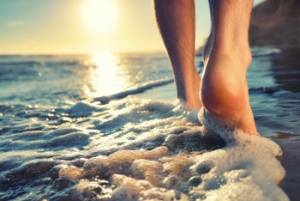Blog

The Effects of Excessively Sweaty Feet
 Plantar hyperhidrosis is a medical condition that causes the feet to sweat excessively. An overabundance of sweat can make the skin of the feet break down, become pale and wrinkled, red and inflamed, or cracked. The feet may also emit a foul odor as sweat is broken down by bacteria. Excessive sweat can ruin shoes and socks, make you more likely to slip and fall, and be embarrassing in public. Fortunately, plantar hyperhidrosis can be treated effectively. Antiperspirants can be prescribed and applied directly to the skin to reduce sweating. Iontophoresis and botox injections into the feet are two other potential solutions. If you have excessively sweaty feet, it is suggested that you consult with a podiatrist to find the right treatment for you.
Plantar hyperhidrosis is a medical condition that causes the feet to sweat excessively. An overabundance of sweat can make the skin of the feet break down, become pale and wrinkled, red and inflamed, or cracked. The feet may also emit a foul odor as sweat is broken down by bacteria. Excessive sweat can ruin shoes and socks, make you more likely to slip and fall, and be embarrassing in public. Fortunately, plantar hyperhidrosis can be treated effectively. Antiperspirants can be prescribed and applied directly to the skin to reduce sweating. Iontophoresis and botox injections into the feet are two other potential solutions. If you have excessively sweaty feet, it is suggested that you consult with a podiatrist to find the right treatment for you.
If you are suffering from hyperhidrosis contact Dr. Dean D. Hinners of Illinois. Our doctor can provide the care you need to attend to all of your foot and ankle needs.
Hyperhidrosis of the Feet
Hyperhidrosis is a rare disorder that can cause people to have excessive sweating of their feet. This can usually occur all on its own without rigorous activity involved. People who suffer from hyperhidrosis may also experience sweaty palms.
Although it is said that sweating is a healthy process meant to cool down the body temperature and to maintain a proper internal temperature, hyperhidrosis may prove to be a huge hindrance on a person’s everyday life.
Plantar hyperhidrosis is considered to be the main form of hyperhidrosis. Secondary hyperhidrosis can refer to sweating that occurs in areas other than the feet or hands and armpits. Often this may be a sign of it being related to another medical condition such as menopause, hyperthyroidism and even Parkinson’s disease.
In order to alleviate this condition, it is important to see your doctor so that they may prescribe the necessary medications so that you can begin to live a normal life again. If this is left untreated, it is said that it will persist throughout an individual’s life.
A last resort approach would be surgery, but it is best to speak with your doctor to find out what may be the best treatment for you.
If you have any questions please feel free to contact one of our offices located in Metropolis and Eldorado, IL . We offer the newest diagnostic and treatment technologies for all your foot and ankle needs.
Hyperhidrosis of the Feet
Each foot, on average, has about 250,000 eccrine sweat glands that produce half a pint of sweat each day. Sweating is a natural and important bodily function. It regulates the body’s temperature by cooling the skin so that it does not overheat. In individuals with hyperhidrosis, the sympathetic nervous system works in "overdrive", producing far more sweat than what is required. People with plantar hyperhidrosis experience an excess amount of sweat on their feet. It is estimated that 2% to 3% of all Americans suffer from some form of hyperhidrosis. This condition is often caused by neurologic, endocrine, infectious, and other systemic disease. Other factors that may trigger the condition are heat and emotions.
People with hyperhidrosis may notice an overabundance of sweat on their feet, along with a strong odor. The feet may also have a wet appearance coupled with infections such as athlete’s foot or toenail fungus. The sweat may even appear in low temperatures, such as during the winter months. People with plantar hyperhidrosis often need to change their socks several times throughout the day.
The specific cause of hyperhidrosis is unknown, and many believe it may be caused by over-activity. However, others believe the condition is genetic. Caffeine and nicotine are known to cause excitement and nervousness which are two emotions that may make the condition worse.
If you are looking to treat your hyperhidrosis the most important thing you should do is wash your feet every day. You may even need to wash your feet twice a day, if necessary. You should also make sure you are wearing the right socks. Wool and cotton socks are both known to be good for ventilation, meaning they allow the feet to breathe. You should avoid socks made from nylon which trap moisture and lead to sogginess. Other common treatment options are over-the-counter antiperspirants that contain a low dose of metal salt. In some cases, prescription strength antiperspirants that contain aluminum chloride hexahydrate may be necessary. In severe cases, surgery may be required.
Untreated hyperhidrosis can easily lead to complications. Some complications that may arise from the disorder include nail infections, warts, and bacterial infections. Consequently, it is important that you seek treatment from your podiatrist if you suspect that you may have plantar hyperhidrosis.

















